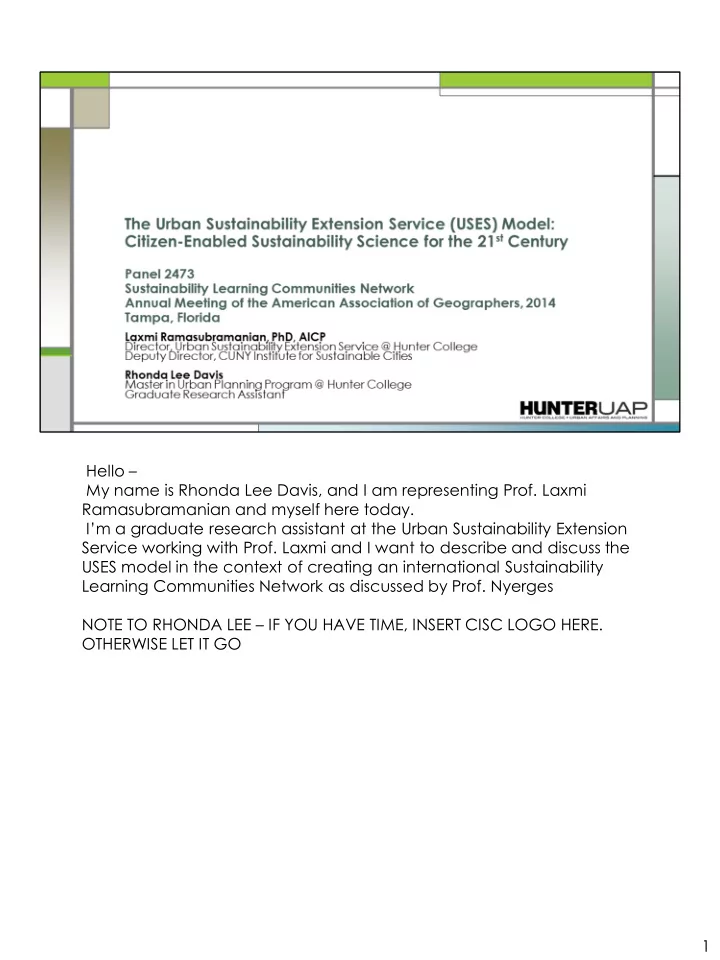

Hello – My name is Rhonda Lee Davis, and I am representing Prof. Laxmi Ramasubramanian and myself here today. I’m a graduate research assistant at the Urban Sustainability Extension Service working with Prof. Laxmi and I want to describe and discuss the USES model in the context of creating an international Sustainability Learning Communities Network as discussed by Prof. Nyerges NOTE TO RHONDA LEE – IF YOU HAVE TIME, INSERT CISC LOGO HERE. OTHERWISE LET IT GO 1
Prof. Laxmi and I have structured the presentation thus I’ll speak briefly about the complexities of doing university -based outreach work in area of sustainability Discuss our experiences with USES in East Harlem And conclude with a discussion about why its important to engage citizens actively in developing sustainability information science If Prof. Laxmi were here, she would have spoken directly about the linkages to the Sustainability Learning Communities Network but its my hope that the other professors on the panel can help foster these linkages.. 2
Universities and colleges have always been centers of innovative thinking. The American model of the land grant/extension service program developed in the late 19 th and early 20 th century firmly established the ideal of extending the knowledge and expertise present within the academy in service of the region. While the traditional extension programs had many positive benefits such as providing expertise and guidance to improve farming practices, they also created a hierarchical relationship that sometimes devalued local knowledge and experience. Yet, the land grant/extension service model, supported through government funding fundamentally changed rural America. the student protests and activism of the 1960s helped foster university- based design/planning centers that focused on addressing community concerns. These efforts, largely urban, developed innovative models of community outreach and engagement to harness resources available within the university to respond to the needs of the neighborhood surrounding the university. The HUD-supported Community Outreach Partnership Centers Program (COPC) supports 3
Community Design Centers, another model of higher-education – community engagement 3
Sustainability, Resilience – these are terms that have specific meaning to scientists, but have entered the mainstream as buzz words Thus, when community people speak about sustainability, they may mean a variety of concepts, and sometimes they mean Sustaining (maintaining) the functioning of the system or resources… typically, there is an inclusion of considerations of equity. When scientists speak about sustainability – they are often emphasizing 4
– the three E’s (equity, economy, environment) although environmental sustainability seems to dominate the dialogues Examples of outreach - the most popular are informal linkages where a professor or a student has a personal connection to a community organization or group and uses his or her expertise to help address a specific problem experienced by that community… Rhonda – I think you can discuss each of these items in one or two sentences.. Long term research, education and Advocacy in one neighborhood – is what USES is trying to do in East Harlem – and we will discuss this in the next slide… The university calendar – semester, quarter, breaks, define the scheduling of exchanges and conversations Research agenda focused on policy formulation, research briefings, longitudinal studies, evaluations etc.. Not on ameliorating immediate concerns.. There is nothing wrong per se - just acknowledging that communities (ARE NOT HOMOGENEOUS) and that universities and communities have different needs and expectations from partnerships seems important… 4
5
6
7
8
Recommend
More recommend